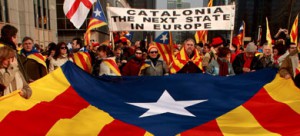Catalonia and Spain: a new scenario. What about the EU?
The relation between Catalonia and the rest of Spain –basically the Central Government, in charge of the redistribution of the revenues- has historically been at odds. Nevertheless, the demonstration that occurred on 11th September could mean the beginning of something completely new, the independence of the Catalan region.

So many interrogates remain nevertheless. Would this be possible under the Spanish Constitution? It doesn’t seem the case. The article 92 of the Constitution says literally that consultative referendums can be held on “political decisions of special importance”, but only if the government and the Congress of Deputies approved it.
Even if they did so, and the referendum was held, and put ourselves in the case that a majority of the Catalan people say “yes”, to be effective, the Constitution would have to be amended, as the article 2 refers to the “indissoluble unity of the Spanish Nation, the common and indivisible homeland of all Spaniards”. This amendment would come under the provisions of article 168, which would require the two-thirds majority of both chambers; the dissolution of them and a general election; the approval –again- of the amendment by two-thirds majority in the new chambers elected, and a final ratification by (national) referendum.
If that situation were to happen, then it would be clear that the secession of the territory of Catalonia had been agreed with the rest of Spain, so the main difficulties wouldn’t remain in cause.
If, let’s say, a declaration of unilateral independence by the region were the case, then it would cause many more trouble. Why? First of all, because it wouldn’t respect the national law, the 1978 Spanish Constitution. Second of all, because, “Spain” would be, certainly, against all the moves done by Catalonia. No space for cooperation would be possibly found and the situation for the new state (that had to be recognized by others) would be extremely delicate.
In any of both cases, the status of Catalonia within the EU would have to be revised. Would the Catalan citizens still remain as European citizens? Several authors, as Jordi Matas, Alfonso González, Jordi Jaria and Laura Román, in a book called “the internal enlargement of the European Union” (2010), say so: “The Union should be capable of replying to the democratic aspirations of a part of its citizens in the sense of constituting a new state, which would discard ex novo admission… (at the same time) the central core of the law of the Union, configured by fundamental rights and democratic principle, it should be said that the Treaties cannot be used in the sense of frustrating the will of a legitimate majority, in this case that of the European citizens who are nationals of a certain sate and inhabitants of a certain territory, who democratically decide to constitute a new state different from that to which they had previously belonged, without giving up their status as European citizens, for the opposite would be the same as sanctioning someone for exercising a legitimate right”.
This legitimate right (the binding referendum of a region, and in the end to declare itself “independent”), as we have seen before, is non-existent under the current legal framework.
In a study held by Andrés Ortega and José María de Areilza in 2000, called “Escisión y Permanencia en la UE” (Split and Continuance in the EU), the authors claimed that the EU was formed by states and not territories, so in case a territory of a state decided to become independent, they should ask for the admission to the European club, which would have to be accepted by the other Member States. In the same sense, the President of the Commission, José Manuel Barroso said on 12th September that “all new states have to apply to join the EU and must be accepted by existing members”. That theory is shared by the Spanish Government as well, as it was shown by a statement made by the Minister of Foreign Affairs, José Manuel García-Margallo.
So, what should Catalonia do? This question is risky, though it is clear that the answer should be given by the Catalans themselves. Should they lead Spain, as Gallardón, the Minister of Justice has recently said, or should they simply leave it? The President of the Generalitat (the regional government), Artur Mas, is clearly pro-independence, but not his party (or not until now). Next regional elections, which are supposed to be taking place in 2014, could be before if the current government decides it. The political parties should say clearly if they are pro-independence or not, to let people decide in a so important matter.
In case pro-independence parties win the elections, then we will have a new scenario, where all options could be on the table. But we shouldn’t forget that, until now at least, the support given to pro-independence options has been minor, and a demonstration is just a demonstration until it’s not proven that the majority of the people of Catalonia think it’s best not to be with the rest of Spain.
Last but not least, Artur Mas say even if Catalonia turned out to be a new state, the links with Spain would remain very intense, with the possibility of even not having an army (would it benefit from the Spanish one?). Also, and it’s not a minor question (remember what football means in Spain), the F.C. Barcelona’s president, Sandro Rosell, said that “in an independent Catalonia, we would play the Spanish National League”.